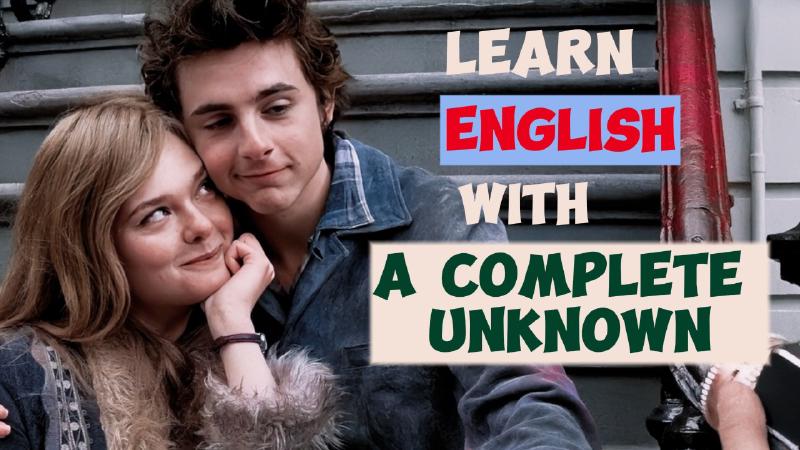Video lesson
Welcome
Hello, everyone! Welcome to the English lesson with a famous musician Bob Dylan and his girlfriend Sylvie from the movie ‘A Complete Unknown’. It’s a great way to practice your listening skills and pick up some phrases, compliments, and idioms to use in everyday conversations.
Learn words and phrases
Sylvie says, ‘You’re good.’ Now, in this context, she’s not saying he’s a good person—she’s saying he’s talented or skilled at writing songs. It’s a casual way to give a compliment in English. You can say this to someone who’s good at something, like singing, drawing, or even cooking. For example, if your friend makes a delicious cake, you can say, ‘Wow, you’re good!’
When Bob says, ‘What, you mean for my age?’, he’s being a little humorous here. He’s asking if Sylvie is impressed by his songs just because he’s young. It’s a funny way to respond to a compliment. For example, you can use this if someone compliments your pronunciation, and you want to joke around, like, ‘What, you mean for someone who just started learning English?’
Bob says, ‘I used to live on these things’. Now, he’s not saying he literally lived on peanuts. That would be weird! In English, when we say ’live on something,’ it means we ate or used that thing a lot. For example, if you eat pasta every day, you can say, ‘I live on pasta!’ It’s a fun, exaggerated way to say you really like something or depend on it.
Bob mentions ‘strongmen’ and ‘fire-eaters’. These are performers you might see at a carnival or circus. A strongman is someone who lifts really heavy things, like weights or even people! And a fire-eater is someone who - you guessed it - eats fire! It’s a dangerous and exciting performance. So, Bob is describing the kind of people he saw on stage.
‘wrinkly’ is an adjective that describes something with a lot of wrinkles - those little lines or folds you see on surfaces. For example, when people get older, their skin can get wrinkly, like a raisin or an elephant’s skin. Or, if you leave your clothes in a pile for too long, they get all wrinkly too! In this scene, Bob says the woman looked like a ‘grown-up, wrinkly baby’ because her skin was badly burned, had a lot of folds, and looked unusual.
Bob says, ‘Have to kinda be a freak.’ Now, don’t worry—he’s not being mean! In this context, ‘freak’ means someone who’s unusual or different. Bob is saying that to be a great performer, you need to stand out and be unique. It’s like saying, ‘You have to be special to capture people’s attention.’ For example, if someone has a really unique fashion style, you might say, ‘Wow, they’re such a freak—in a good way!’
Bob says, ‘That voice ain’t human.’ He’s talking about Frank Sinatra, the famous singer. When he says ‘ain’t human’, he means Sinatra’s voice is so amazing, it’s almost supernatural. It’s a big compliment! You can use this phrase to describe something that’s so good, it’s hard to believe. For example, if you see an incredible dancer, you can say, ‘Their moves ain’t human!’
‘plain’ means not decorated in any way; with nothing added. It’s ordinary or boring, like a blank piece of paper or a bowl of plain rice.
Bob says, ‘Picasso’s overrated.’ It’s controversial! When we say something is overrated, we mean it’s not as good as people say it is. For example, if everyone loves a movie, but you don’t, you can say, ‘I think that movie’s overrated.’ It’s a strong opinion, so use it carefully!
“Bette Davis was a mousy girl.” When Sylvie says ”mousy”, she doesn’t mean Bette Davis was literally a mouse! In English, calling someone mousy means they’re quiet and shy, like a mouse, which is small and doesn’t stand out much. Bette Davis was an actress, who started as a shy, unremarkable girl before she became a star. You might use the word ‘mousy’ to describe someone who’s not very confident or noticeable at first. For example, you might say, ‘She was a mousy girl, but now she’s so outgoing!’
‘find yourself’ means discovering who you really are. But Bob is joking that it’s not like losing a shoe and then finding it. He’s saying it’s not that simple, it’s a process of change. You can use this phrase to talk about personal growth. For example, ‘After traveling the world, I finally found myself.’
And that’s the end of the scene! I hope you enjoyed it. We learned a lot, try using these words and expressions in your own conversations or writing. Thanks for watching, and I’ll see you in the next lesson.

